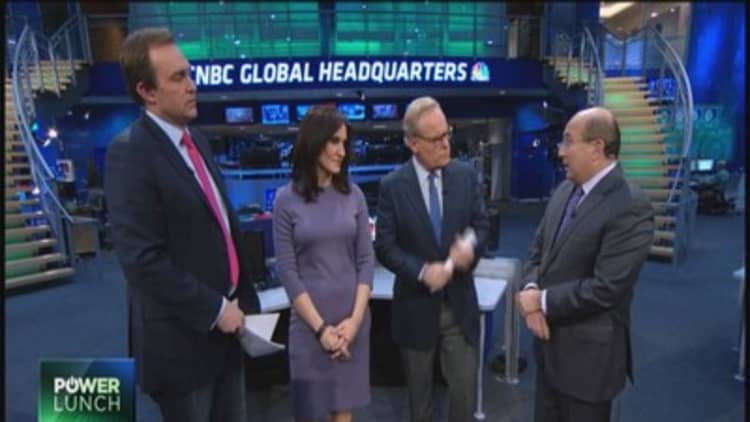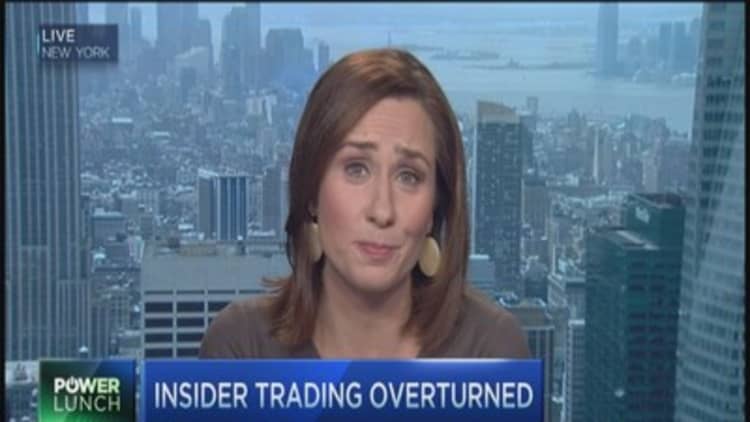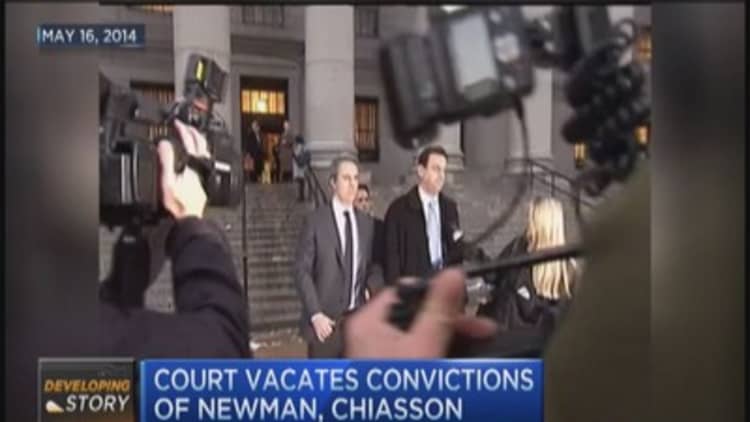


The future of insider trading is here, and it will probably be harder to prosecute.
A federal appeals court decision Wednesday significantly redefined insider trading and may have altered the course of all further enforcement, experts said. The court's findings, which overturned convictions for former hedge fund managers Todd Newman and Anthony Chiasson, place a much higher burden on prosecutors and could even change how business is done on Wall Street, legal experts said.
Read MoreInsider trading convictions overturned for Newman, Chiasson
"The stunning decision ... has the potential to rewrite the book on insider trading, while also dealing a body blow" to Justice Department and the Securities and Exchange Commission efforts, former assistant U.S. attorney Patrick Cotter said in a statement to CNBC.
The opinion by Judge Barrington Parker focused on two major reasons for overturning the convictions: The court argued that the trial judge had not adequately instructed the jury on a technical matter, and that the definition of the crime requires that would-be traders know the tipster is receiving significant personal benefit from his or her actions.
That first opinion will not have long-lasting effects, but the latter point is "a pretty significant push back" on existing practice, said Rick Holwell, a former federal judge now in private practice.
"Until this decision, most commentators and most courts were of the view that—as a quasi-technical matter—the government had to prove that the tippee knows that the tipper has breached his fiduciary duty in return for some personal benefit," Holwell said. "But that standard was ridiculously low heretofore, and the standard was so negligible that it never really posed any problem to the prosecutor."
Read MoreThe truth about insider trading
In fact, to secure a conviction, prosecutors only needed to indicate that the tipper was leaking nonpublic information for the sake of friendship, Holwell said. Now, the government will be forced to prove that a trader knew of direct personal benefit to the source of a leak.
This change is "really going to hamstring the prosecutors," Holwell said, because most insider trading cases see information spread out semi-anonymously from its original source. Still, the new standards from the decision will require conclusive evidence on this matter in order to prove that traders knew they were doing something illegal.
"Some would argue you'd have to be brain-dead when you get this information not to know that there's illegality involved," Holwell said. "I think the decision is a little naive."
Read MoreInsider trading suspect bolts—barefoot—from cameras
Still, some legal experts said the 2nd U.S. Circuit Court of Appeals made the right decision Wednesday.
Yasho Lahiri, an attorney active in hedge fund law, said the ruling rightly will allow financial professionals to conduct fact-finding without fear that third-hand information can land them in prison.
"I think the important thing is that in order to have efficient markets you have to have incentives to do research," he said, adding that the only insider trading crimes now will involve direct bribes or "willful blindness" to such a situation.
Read MoreCommentary: It's time to legalize insider trading
"In my mind, while insider trading is bad—commercial bribery is egregious—what is not bad is the connect-the-dots approach to information. ... The reason hedge funds make money is they connect disparate sources of information," Lahiri said. "That ought not to be insider trading."
By redefining the crime of insider trading—a violation that is historically detailed in court decisions rather than legislation—the opinion also takes "a lot of air out of the much ballyhooed claim" from Manhattan U.S. Attorney Preet Bharara that he is cracking down "on what was represented to be rampant insider trading," Cotter said.

"It appears that [Bharara] was, in fact, prosecuting and putting people in jail for actions that were wholly legal," the former assistant U.S. attorney said.
In a statement, Bharara said Wednesday's decision "interprets the securities laws in a way that will limit the ability to prosecute people who trade on leaked inside information." As a consequence, he said, the court's decision will affect "a subset" of recent cases.
Read MoreLegalize insider trading? That's ridiculous
In fact, lawyers for two former SAC Capital managers accused of insider trading issued statements in response to the ruling on Newman and Chiasson. Counsel for Michael Steinberg said the decision "clearly means that Michael Steinberg is innocent of any crime and his conviction will be vacated as well."
An attorney for Mathew Martoma said the court's opinion shows "that the government does over-reach in its haste to make headline grabbing cases."
Experts were split on whether the changes to insider trading's definition will be permanent. Lahiri said he thought it unlikely that another court would issue a conflicting ruling, thereby making it the law of the land. But Holwell said he expected Bharara to mount an appeal of some sort.
And while criminal cases will be the most obviously affected, the ruling could also influence securities enforcement operations, according to Eugene Goldman, a former SEC enforcement lawyer who practices in white collar securities defense.


